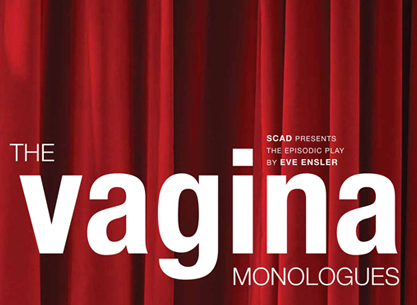 The SCAD community witnessed two moving performances of “The Vagina Monologues” Feb. 18-19. Produced exclusively by SCAD students, the production was the first of its kind at SCAD Atlanta. The proceeds from both performances and the accompanying bake sale were donated to Innocence Atlanta, an organization that aims to raise awareness and pushes for the elimination of child sex-trafficking in Atlanta.
The SCAD community witnessed two moving performances of “The Vagina Monologues” Feb. 18-19. Produced exclusively by SCAD students, the production was the first of its kind at SCAD Atlanta. The proceeds from both performances and the accompanying bake sale were donated to Innocence Atlanta, an organization that aims to raise awareness and pushes for the elimination of child sex-trafficking in Atlanta.
Although performance arts courses are not offered at SCAD Atlanta and even though many of the cast members had previous theater experience, they all gave heartfelt performances.
The lack of experience did not diminish the dialogue, and it was even an advantage, according to Kat Reynolds, who was both director and a performer.
“We actually wanted women who were non-performers,” Reynolds said. “This was important because the author [playwright Eve Ensler] wanted the actors to make use of note cards, as well as have the least amount of rehearsals necessary to create a bond between the cast.”
Reynolds went on to explain that throughout December, they all met for three hours, once a week. Rehearsing was kept minimal to evoke the most sincere feelings and reading by the cast, rather than chance the degradation of the dialogue through memorization. The intentional unpracticed delivery provided for an ideal atmosphere.
Julie Sharpe gave a hilarious and on-pointe delivery of the monologue, “My Angry Vagina,” which consisted of a brazen-yet-poetic laundry list of the tribulations women face just because they’re women. Among them, the sadistic nature of tampons; the ludicrousness of letting your boyfriend “tell you you’re supposed to smell like rose petals” down there; and the cold, awkward atmosphere of gynecological visits.
In, “The Vagina Workshop,” a woman speaks about having “vaginal wonder” after unwittingly discovering herself during a seminar. Delivered with exceptional poise and restraint by Nandhini Mehra, the woman’s monologues speaks of participating in guided workshop exercises, which brought to her mind “how the early astronomers must have felt with their primitive telescopes.”
Mehra joined the cast with her friend Silvina Guerreiro. “We got involved after seeing posters around school,” she said. “And they needed someone with a British accent.”
The play oscillated scene to scene, from extremes of somber confession to hilarity. A piece detailing horrendous violence committed against women in Bosnia left some audience members breathless and stunned. Other scenes took our breath away for different reasons, such as the monologue of a lawyer-turned-dominatrix who was addicted to the sound of women moaning.
Tears of sorrow mixed readily with tears of laughter in this inspiring, professionally amateur performance, given by a gifted cast of women.
Editor’s note: The article was corrected to accurately reflect the previous acting experience of the cast members.



















